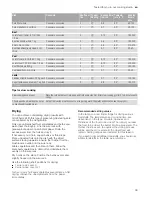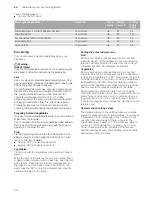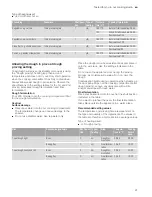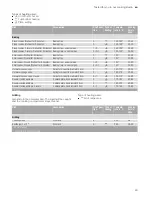
Tested for you in our cooking studio
en
33
Covered cookware
When cooking with covered cookware, the cooking
compartment remains considerably cleaner. Ensure that
the lid fits well and closes properly. Place the cookware
onto the wire rack.
The distance between the meat and the lid must be at
least 3 cm. The meat may rise.
Very hot steam may escape when opening the lid after
cooking. Lift the lid at the rear, so that the hot steam
can escape away from you.
If necessary, braise the meat first by searing it. Add
water, wine, vinegar or a similar liquid to the braising
liquid. A covering approx. 1-2 cm deep should be
applied to the base of the cookware.
The steam evaporates in the cookware when roasting.
Carefully pour in more liquid if required.
Meat can also become crispy in a covered roasting
dish. To do so, use a roasting dish with a glass lid and
set a higher temperature.
Grilling flat pieces
Flat pieces of poultry, meat and fish, such as steaks,
drumsticks and burgers, can be prepared well using the
"Grill" heating type. Excellent results are also achieved
when grilling toast.
Grilling
Keep the appliance door closed when using the grill.
Never grill with the appliance door open.
Slide the universal pan into the oven at the indicated
shelf position with the wire rack attached. Dripping fat
will be collected. Ensure that the wire rack is positioned
correctly on the universal pan.
~
"Accessories"
on page 9
Note:
When grilling very fatty items, do not slide the
universal pan in directly under the wire rack, but rather
at level 2.
When grilling, try wherever possible to use pieces of
food which are of a similar thickness and weight. This
will allow them to brown evenly and remain succulent
and juicy. Place the food to be grilled directly onto the
wire rack.
Use tongs to turn the pieces of food you are grilling. If
you pierce the meat with a fork, the juices will run out
and it will become dry.
Do not add salt to the meat until after it has been
grilled. Salt draws water from the meat.
Notes
■
The grill element switches itself on and off
continuously; this is normal. The set temperature
determines how frequently this occurs.
■
Smoke may be produced when grilling.
Recommended setting values
In the table, you can find the ideal heating type for your
poultry, meat and fish, in addition to toast. Temperature
and cooking time depend on the quantity, composition
and temperature of the food. Settings ranges are
indicated for this reason. Try using the lower values at
first. You can use a higher setting next time if
necessary.
The setting values are based on the assumption that
unstuffed, chilled, ready-to-roast poultry, meat and fish
are placed into a cold cooking compartment.
In the table, you can find specifications for poultry, meat
and fish with default values for the weight. If you wish to
prepare heavier poultry, meat or fish, use the lower
temperature in every case. If roasting several joints, use
the weight of the heaviest piece as a basis for
determining the cooking time. The individual pieces
should be approximately equal in size.
A general rule: the larger the poultry, meat or fish is, the
lower the cooking temperature and the longer the
cooking time.
Turn the poultry, meat and fish after approx.
^
to
Z
of
the indicated time.
Remove unused accessories from the cooking
compartment. This will achieve the best possible
cooking results and energy savings of up to 20 per
cent.
Types of heating used:
■
‡
Circo-roasting
■
ˆ
Grill, large area
Dish
Accessories
Shelf po-
sition
Type of
heating
Tempera-
ture in °C
Cooking time
in mins.
Beef
Steaks, height 2-3 cm**
wire rack
4
ˆ
290
1st side 10-12
2nd side 3-5
Burger, height 1-2 cm
wire rack
4
ˆ
290*
1st side 6-8
2nd side 4-6
Slow roast joint
wire rack
2
‡
180-200
30+30
Top side / Top rump
wire rack
2
‡
150-160
30+30
* Preheat
** Do not preheat
*** Preheat 3 minutes
**** Preheat 3 minutes, turn over several times
Содержание B57CR22.0B
Страница 1: ...en INSTRUCTION MANUAL Built in oven B57CR22 0B...
Страница 2: ......












































